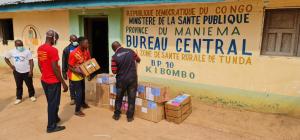African region faces an unprecedent surge in mpox cases
Brazzaville – The African region is experiencing an unprecedented increase in mpox cases since the start of 2024, with more countries previously unaffected by the disease reporting cases in an expanding spread of the virus.
World Health Organization (WHO) has elevated the mpox outbreak response to the highest-level requiring organization-wide mobilization and scale-up. In addition, WHO Director-General Dr Tedros Adhanom Ghebreyesus has called for an emergency committee of experts meeting to determine whether the outbreak constitutes a Public Health Emergency of International Concern.
Fifteen African countries are currently reporting mpox outbreak, with a total of 2030 confirmed cases and 13 deaths so far this year compared with 1145 cases and seven deaths in the whole of 2023. Four countries – Burundi, Kenya, Rwanda and Uganda – previously unaffected by mpox have reported cases since mid-July 2024.
In the Democratic Republic of the Congo, which accounts for more than 90% of the reported cases, a new variant that emerged in September 2023 is circulating in its eastern region. Neighbouring Rwanda and Uganda have reported cases of the new variant. Kenya has also confirmed cases of the new variant. Analysis are ongoing in Burundi to determine whether the reported cases are due to the new variant.
“The priority is to rapidly interrupt the transmission of the virus. We’re collaborating with partners in support of countries to reinforce outbreak control measures and ensure that communities are central to ongoing efforts to effectively end these outbreaks,” said Dr Matshidiso Moeti, WHO Regional Director for Africa.
The pattern of transmission varies across the region, with the spread of new variant (known as clade 1b) in eastern Democratic Republic of the Congo linked to transmission through sexual contact and high population movement, while in South Africa most of the cases are among people identifying as men having sex with men. Transmission in West and Central Africa is associated with the 2022 global outbreak. However, further analysis is required to better understand the patterns of transmission to refine the response to the outbreak.
WHO is working at the global, regional and national levels as well as with partners, including the Africa Centres for Disease Control and Prevention and others to ensure effective response to the outbreak.
In the African region, WHO is working through country teams and experts deployed on the ground to support national authorities strengthen key response areas, including disease surveillance, diagnosis testing and clinical care, infection prevention and control. WHO is working with the health authorities to access therapeutics, decentralize laboratory services for enhanced diagnostic capacities, and ramp up efforts to raise awareness about the risk of the disease among communities.
Field investigation and active case finding are also being reinforced in the affected and at-risk countries. The Organization is coordinating closely to enhance contact tracing, leveraging experience from prior outbreaks to ensure interventions best support and elevate the needs of key populations. WHO is also mobilizing financial support to help countries effectively respond to the outbreak.
WHO is advancing the process for Emergency Use Listing Procedure, an approach to assess and list unlicensed vaccines, therapeutics and diagnostics to expediting their availability for use during public health emergencies. The Organization is already working closely with countries to develop their vaccination strategies and plans, to roll out the vaccines as soon as they are available. Vaccines are one among many public health tools that are used to control mpox.
Mpox is transmitted from animals to humans, with cases often found close to tropical rainforests where there are animals that carry the virus. The disease can also spread from humans to humans through contact with bodily fluids, lesions on the skin or on internal mucosal surfaces, such as in the mouth or throat, respiratory droplets and contaminated objects.
Treatment of mpox patients is supportive dependent on the symptoms. Various therapeutics that may be effective against mpox are being developed and tested. Prevention and control of rely on raising awareness in communities and educating health workers to prevent infection and stop transmission.




